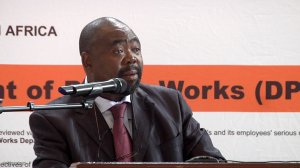July 4, 2014.
For Creamer Media in Johannesburg, I'm Anine Vermeulen.
Making headlines:
Africa needs to strike a new investment–consumption balance.
Eskom warns that energy demand is expected to rise next week.
And, Public Works Minister Thulas Nxesi says he will assist in establishing collective bargaining in the construction sector.
African countries should be targeting minimum investment levels of 25% of gross domestic product to sustain economic growth and to improve prospects for job creation and poverty reduction.
However, a new United Nations Conference on Trade and Development report also warns that simply increasing the quantity of investment will be insufficient and that countries should, therefore, also become more active in directing investments towards priority infrastructure and key sectors such as agriculture and manufacturing.
The ‘Economic Development in Africa Report 2014’ argues that increasing the productivity or quality of investment will also be important, while also noting major gains in this area over the past two decades.
Unctad’s Patrick Osakwe says policymakers need to pay closer attention to improving the balance between consumption- and investment-led growth, while also aligning macro- and micro-economic policies towards encouraging greater domestic and foreign direct investment.
State-owned power utility Eskom said it expected demand to increase next week as a cold front moved to Gauteng.
According to the power utility’s state of the power system update, the national power grid remained stable, but constrained.
Eskom forecast peak demand at 30 673 MW on Friday, 31 218 MW on Saturday, 32 046 MW on Sunday, 34 599 MW on Monday, 34 708 MW on Tuesday and 34 654 MW on Wednesday.
Public Works Minister Thulas Nxesi said he would initiate a forum through which organised labour could meet with construction industry employer associations in an attempt to establish collective bargaining in the sector.
Speaking at a National Union of Mineworkers (NUM) central committee meeting, he noted that various construction industry associations didn’t want to accept collective bargaining, which was why members were so exploited in those sectors, he claimed.
Nxesi stated that the worst exploitation of, and injuries to, workers were found in the construction sector and, as the industry was on the rise owing to significant infrastructure development programmes, unions couldn’t be expected to strategise on how to organise workers in this industry.
Also making headlines:
President Jacob Zuma appoints several inter-ministerial committees.
Egyptian security sources said five men died in Cairo in separate incidents involving a bomb blast and protester clashes with security forces on Thursday, which was the first anniversary of the ouster of Islamist President Mohamed Mursi.
And, West African countries and international health organizations have adopted a fresh strategy to fight the world's deadliest Ebola epidemic, which has killed hundreds of people in Guinea, Sierra Leone and Liberia.
Also on Polity today:
Watch the latest multimedia interview with Dr Johan Burger from the ISS on policing in South Africa.
Follow us on Twitter (@PolityZA) for updates on breaking news.
That’s a roundup of news making headlines today.
EMAIL THIS ARTICLE SAVE THIS ARTICLE
To subscribe email subscriptions@creamermedia.co.za or click here
To advertise email advertising@creamermedia.co.za or click here










